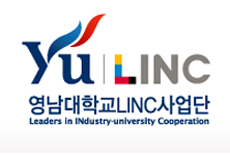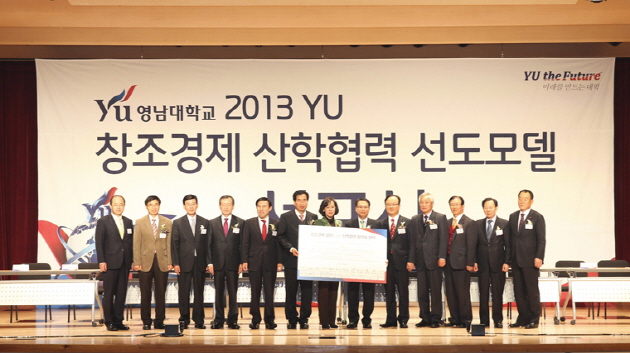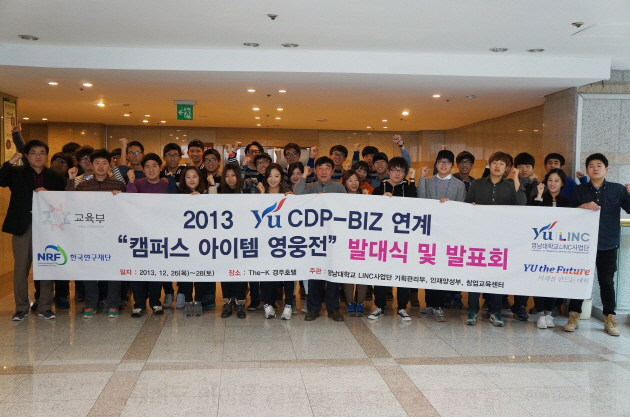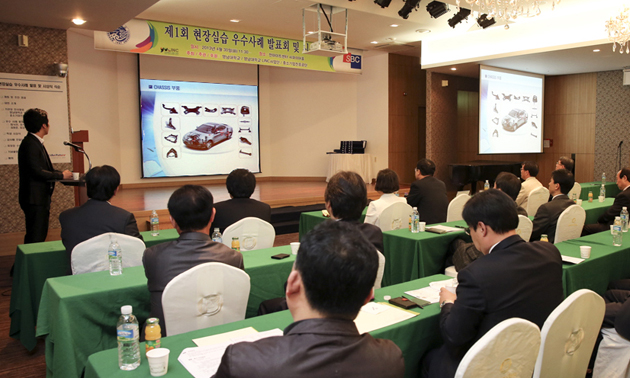YU Selected for Stage 2 Leaders in Industry-University Cooperation (LINC) Fostering Project N
No.88671- Writer YU
- Date : 2014.05.19 18:12
- Views : 8728
Only provincial private universities selected for technological innovation types are YU and Chosun University
Procured approximately 15 billion won in national funding for 3 years
[May 9, 2014]
Procured approximately 15 billion won in national funding for 3 years
[May 9, 2014]

YU (President Noh Seok-kyun) was selected for the Stage 2 LINC Fostering Project that will change the constitution of the university towards industry-academy cooperation. Based on the performance in the stage 1 project, they have procured government support again to pursue stage 2 of the project.
The Ministry of Education carried out the first stage of this project titled the 'LINC Project' for two years in 2012 and 2013. Based on the results of this, the second stage of this project will be carried out for three years from 2014 to 2016. The Ministry of Education announced the assessment results of 51 four-year universities and 29 technical colleges chose in the past, and comparative evaluation results of 43 four-your universities and 33 technical colleges that newly applied to participate in the project from this year. According to this, 56 four-year universities and 30 technical colleges around the nation were selected as the technological innovation or field-type operators of the stage 2 LINC project. These colleges will carry out this project for the next three years.
YU was selected as a technology innovation-type LINC operator. In this project, only 15 colleges in the nation were selected for the technology innovation-type project, and only two private provincial universities selected were YU and Chosun University. Accordingly, YU will receive a total of approximately 15 billion won in funding by the nation for the next three years.
The YU LINC project team (director Lee Hee-young) was selected as a technology innovation-type LINC operator in the 1st stage of the project (2012-2013) and pursued various industry-academic cooperation projects with the participation of six departments of the College of Engineering, three departments of the College of Sciences, two departments from the College of Business & Economics, and the School of Biotechnology for a total of 14 departments together with over 500 family businesses. In particular, they newly employed 'industry-academic cooperation focus professors' and established the 'Venture Education Center' and 'Field Training Support Center' to strengthen industry-academic cooperation friendly educational curriculum such as the 'multi-disciplinary/corporate linked capstone design project' and the 'industry academic cooperation track'. In result, over 1,000 students received field training and education.
It was also selected for the Ministry of Education's metropolitan economic belt leading industry in 2009 and based on its performance in operating the green energy talent fostering center', it focused on R&D and fostering talented human resources in the renewable energy sector. Furthermore, it also established the 'corporate support center' to provide 'Allset' corporate support. Meanwhile, from November of last year, they opened the '2013 YU Creative Economy Industry-Academic Cooperation Expo' to construct a new industry-academic-government model. In January of this year, they held the 'YU Tech-Biz Meeting' to transfer the superb technologies of the university to companies to take the initiative in commercialization, as it played a leading role in creating a win-win model between the university and local companies.
The YU LINC Project Team is planning to expand the stage 2 project to the humanities tracks as well. Accordingly, a total of 23 departments in 8 colleges including the Department of Sociology and the School of Economics and Finance will participate in the project to focus on fostering creative human resources by implementing the 'Y-type Human Resource Certification System', reorganization of the undergraduate program to realize creative economy, and fostering convergence human resources through linking and associate majors. Meanwhile, it will also actively pursue international industry-academic cooperation projects as well.


